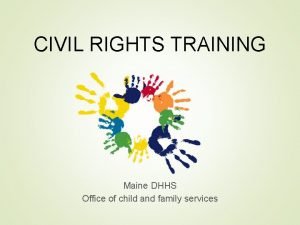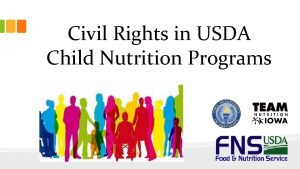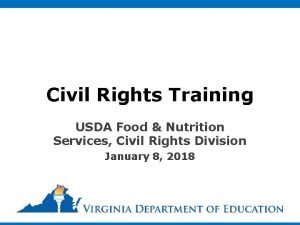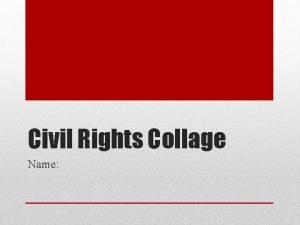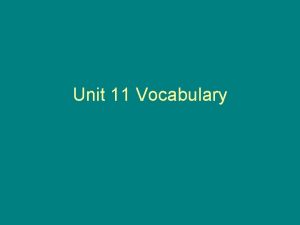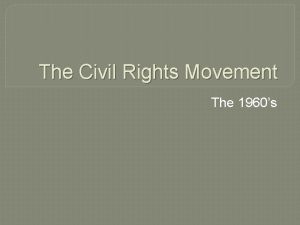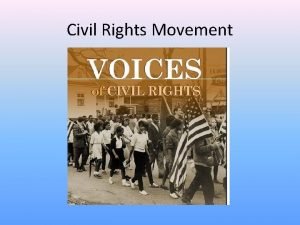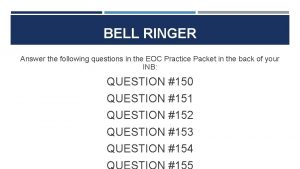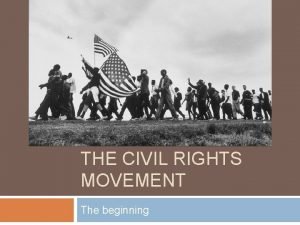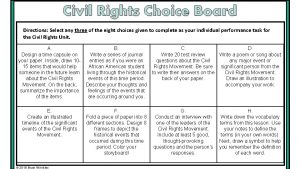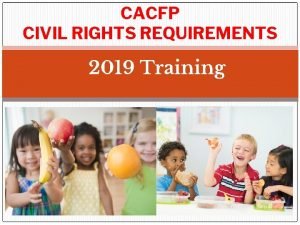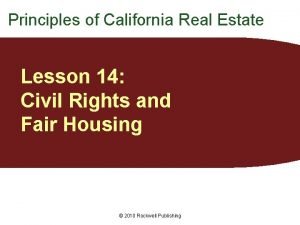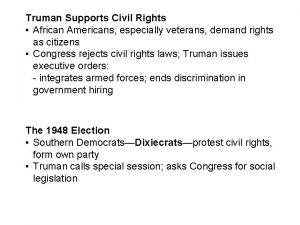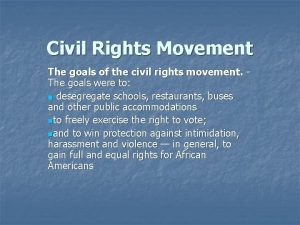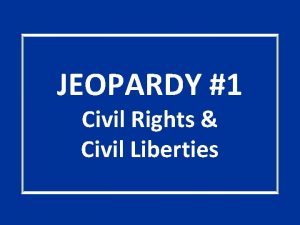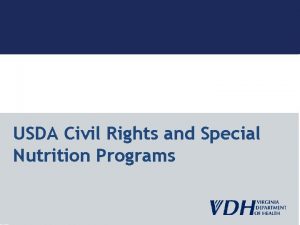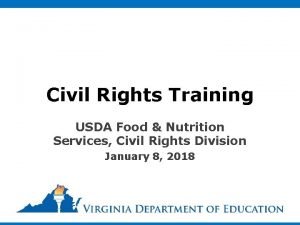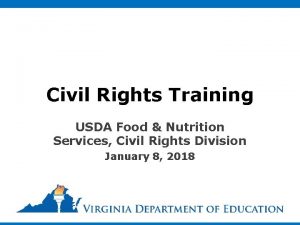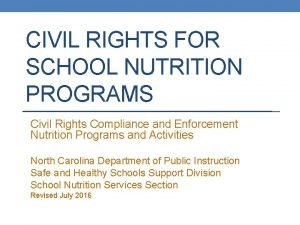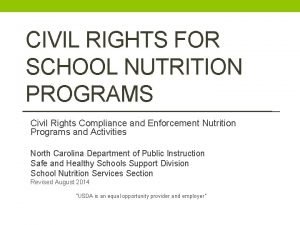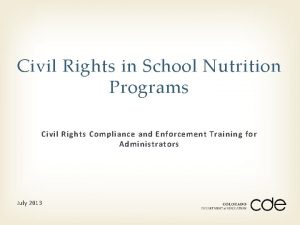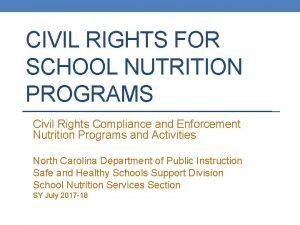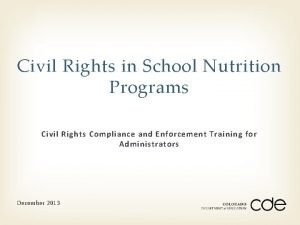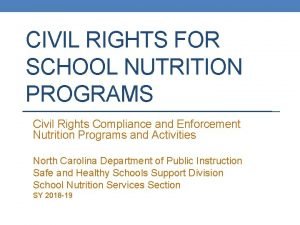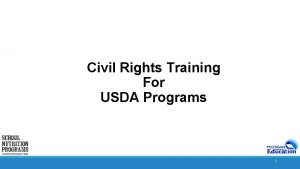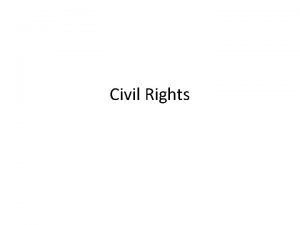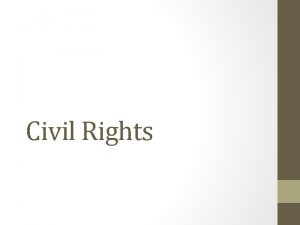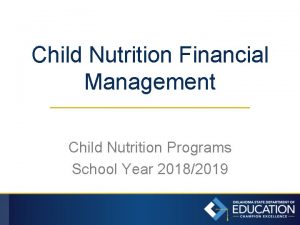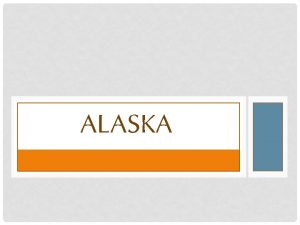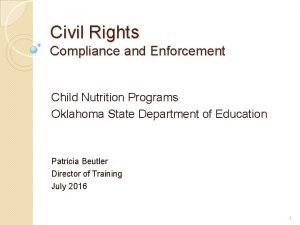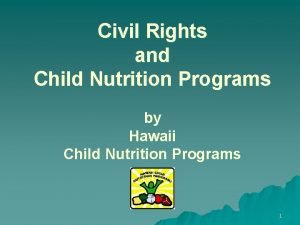Civil Rights in Alaska Child Nutrition Programs USDA































- Slides: 31

Civil Rights in Alaska Child Nutrition Programs

USDA Civil Rights � Benefits of Child Nutrition Programs are made available to all eligible participants in a nondiscriminatory manner. � All sponsors must implement Civil Rights requirements

What is Discrimination? Discrimination is defined as different treatment which makes a distinction of one person or a group of persons from others; either intentionally, by neglect, or by the actions or lack of actions based on….

Protected Classes � Race � Color � Sex � Age � National Origin � Disability

Recognizing a Complaint A complaint of unequal treatment may be submitted: � Verbally � In Writing Or it may be observed

Discrimination Occurs: The 4 “D”s …when an individual or group of individuals are: � Delayed benefits or services � Denied benefits or services �Treated Differently than others to their disadvantage �Given Disparate Treatment

Complaint Procedure � Schools/RCCIs: must have a procedure on file. It may be as simple as referring all complaints to the superintendent who meets with the complainant to resolve issues. � CACFP/Summer Food: may have a procedure on file, can also follow the directions on “and Justice for All” poster. � The presence of a procedure will be confirmed during review.

Reporting Form Found online at http: //www. eed. state. ak. us/tls/cnp/CRR. html

Filing Timeline � File a complaint within 180 days of the alleged discriminatory action.

Complaints Person making complaint may choose to: � Contact USDA directly or � Contact AK CNP directly, or � Notify the sponsor of their complaint Programs must forward all discrimination complaints received within 3 working days

Training All CNP programs must train “frontline staff” who interact with applicants or participants Frontline Staff must: ◦ be able to identify a civil rights complaint ◦ understand the basic right of the individual to file a complaint ◦ Understand follow procedures

Resolution of Noncompliance Definition of “Noncompliance” A factual finding that any civil rights requirement, as provided by law, regulation, policy, instruction, or guidelines, is not being adhered to by a State agency, local agency, or other subrecipient.

Conflict Resolution � Set place for discussion � Define the problem � List possible solutions � Agree on one to try � Agree how each will work to resolve � Set follow-up meeting � Document process and results

Resolution of Complaint Quality Resolutions Procedures � Receive – verbal or written � Accept/File forms � Evaluate � Facilitate resolution/Corrective Action � Report

Non-discrimination Statement In accordance with Federal civil rights law and U. S. Department of Agriculture (USDA) civil rights regulations and policies, the USDA, its Agencies, offices, and employees, and institutions participating in or administering USDA programs are prohibited from discriminating based on race, color, national origin, sex, disability, age, or reprisal or retaliation for prior civil rights activity in any program or activity conducted or funded by USDA. Persons with disabilities who require alternative means of communication for program information (e. g. Braille, large print, audiotape, American Sign Language, etc. ), should contact the Agency (State or local) where they applied for benefits. Individuals who are deaf, hard of hearing or have speech disabilities may contact USDA through the Federal Relay Service at (800) 877 -8339. Additionally, program information may be made available in languages other than English. To file a program complaint of discrimination, complete the USDA Program Discrimination Complaint Form, (AD-3027) online and at any USDA office, or write a letter addressed to USDA and provide in the letter all of the information requested in the form. To request a copy of the complaint form, call (866) 632 -9992. Submit your completed form or letter to USDA by: 1. mail: U. S. Department of Agriculture Office of the Assistant Secretary for Civil Rights 1400 Independence Avenue, SW Washington, D. C. 20250 -9410; 2. fax: (202) 690 -7442; or 3. email: program. intake@usda. gov This institution is an equal opportunity provider.

Too Long? ‘This institution is an equal opportunity provider. ’ � Must be in font size no smaller than the text in the document. � May substitute the word ‘institution’ for the name of the agency/school.

Where Does It Go? � Enrollment Forms � Menus � Employee Handbooks � Print Handbooks � Newsletters � Brochures � Parent or broadcast advertisements � Flyers � Websites All sponsors must have the capability of providing informational materials in the appropriate translation

And Justice For All � The Non-discrimination poster must be placed where participants and potential participants have ready access (office and feeding areas).

Racial/Ethnic Data Collection � Schools/RCCIs: ◦ This data is reported by districts/RCCIs to EED through other reporting methods. � CACFP/SFSP: ◦ Must collect Racial and Ethnic Data annually, however it is optional for participants to provide this information on the Confidential Income Statement (CACFP) or Free and Reduced-Price Application (SFSP) ◦ Sponsor must collect and maintain data annually �Report on CNP database for CACFP centers & SFSP �Sponsors of family day care homes collect by site for annual reporting ◦ CNP will check Racial and Ethnic data during Administrative Reviews

Racial/Ethnic Data Collection � Two-Step Format: - separate categories will be used when collecting and reporting Race and Ethnicity. • Ethnicity will be collected first • Racial designations second

Racial/Ethnic Data Collection Ethnicity: q Hispanic or Latino q Not Hispanic or Latino Racial Designation: q American Indian or Alaskan Native q Asian q Black or African American q Native Hawaiian or Other Pacific Islander q White q Other Racial and Ethnic data may be collected on application or can be collected using a visual identification.

Limited English Proficiency � Recipients of Federal financial assistance have a responsibility to take reasonable steps to ensure meaningful access to their programs and activities by persons with limited English proficiency. � We have responsibility to take reasonable steps to ensure meaningful access to federal programs.

Limited English Proficiency Factors to consider in determining what is reasonable: � Number of LEP individuals � Frequency of contact with the programs � Nature and importance of the programs � Resources available For more information on LEP go to: www. lep. gov

Accomodations for Disabilities � Alternative means for communication of program information (Braille, large print, audiotape, etc. ) should contact USDA’s TARGET Center at (202) 720 -2600 (voice and TTY). � Accommodating dietary needs due to a disability (with physician’s statement and recommended substitutions)

Religious Organizations � Equal opportunities for religious organizations ◦ Ensures a equal participation of faith-based organizations and other community organizations in the USDA programs � This is accomplished by: ◦ Prohibiting discrimination ◦ Allowing to retain independence & display religious art, icons, scriptures, or other religious symbols; and ◦ Ensuring no discrimination against a program beneficiaries on the basis of religion or religious belief.

Assurances � Programs will operate in compliance with all nondiscrimination laws, regulations, instructions, policies and guidelines. � A civil rights assurance is incorporated in the permanent agreements between State agencies and sponsors. � All programs who sign with unaffiliated sites (primarily CACFP and SFSP) will also incorporate the Civil Rights assurance in their agreements. � Vendors must serve all persons in compliance with CR requirements & ensure that program participants treated the same as other customers.

Civil Rights Reviews There are four different types of Compliance Reviews conducted by CNP… � Pre-award for new programs � Routine Compliance Reviews during CNP review � NSLP only: Review of On Site Review Summary Form submitted annually to CNP by February 15 � Special Compliance Reviews – due to complaints

Civil Rights Toolkit � Civil Rights Compliance Power. Point � “…and � FNS � Justice for All” Poster (11 x 17) Instruction 113 -1 FNS Accommodating Special Diet Needs in the School Nutrition Programs � Civil Rights Site Review Form � Civil Rights Complaint Record Found online at: http: //www. eed. state. ak. us/tls/cnp/CRR. html

Civil Rights ‘Must-Do’ List q Offer any Child Nutrition Program in a Non. Discriminatory Manner. q Train staff annually on Civil Rights and document the training. q Ensure CR Complaint Procedure is in compliance with federal requirements q Make available to all staff CR complaint records and CR complaint procedure.

Civil Rights ‘Must-Do’ List display the And Justice for All poster in the office and feeding areas. q Non-discrimination statement must be on all printed materials available to the public which mention USDA and/or Child Nutrition Program meals and snacks. q Prominently

Civil Rights in Alaska Child Nutrition Programs
 Civil rights in child nutrition programs
Civil rights in child nutrition programs Civil rights training child nutrition programs
Civil rights training child nutrition programs Civil rights in child nutrition programs
Civil rights in child nutrition programs Usda civil rights training
Usda civil rights training Civil rights webquest
Civil rights webquest Child nutrition food buying guide
Child nutrition food buying guide Usda food and nutrition service
Usda food and nutrition service Overview of software engineering
Overview of software engineering Chapter 20 civil liberties protecting individual rights
Chapter 20 civil liberties protecting individual rights Right to die
Right to die Title vii of the civil rights act
Title vii of the civil rights act Civil rights cloze notes 1
Civil rights cloze notes 1 Civil rights leaders collage
Civil rights leaders collage Chapter 14 postwar prosperity and civil rights
Chapter 14 postwar prosperity and civil rights Civil rights movement vocabulary
Civil rights movement vocabulary Civil rights sitins
Civil rights sitins Civil rights movment
Civil rights movment Civil rights bell ringers
Civil rights bell ringers Civil rights movement jeopardy
Civil rights movement jeopardy The civil rights movement
The civil rights movement 2015 brain wrinkles answer key
2015 brain wrinkles answer key Civil rights choice board
Civil rights choice board What did sncc accomplish and how
What did sncc accomplish and how Cacfp civil rights
Cacfp civil rights Unruh civil rights act real estate
Unruh civil rights act real estate Mother of the modern day civil rights movement
Mother of the modern day civil rights movement Truman supports civil rights
Truman supports civil rights Civil rights movement goal
Civil rights movement goal Unit 7: modern ga and civil rights
Unit 7: modern ga and civil rights Civil rights jeopardy
Civil rights jeopardy Civil rights training quiz answers
Civil rights training quiz answers Chapter 21 civil rights equal justice under law
Chapter 21 civil rights equal justice under law

